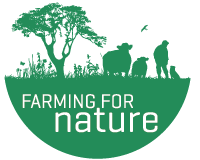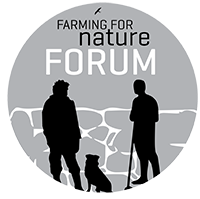Voting is now closed for the Farming For Nature Awards 2022.
Below are our 2022 Farming For Nature Ambassadors that were up for the public vote.
Brigid O Connor
Brigid O’Connor is a lifelong farmer from Camp County Kerry where she runs an organic sheep farming system. Brigid breeds 120 scotch ewes on 54 hectares. The farm is made up of 3 different land types – permanent pasture, heath and commonage. The farm is very extensively managed with minimal external inputs. The family have farmed the land for generations and Brigid is proud to carry on traditional methods of farming handed down to her from her parents and grandparents – “Growing up on a farm, you learn from your parents and your grandparents. I remember my grandfather teaching me things about sheep and it is knowledge that I still use today”. Brigid acknowledges and respects the high nature value of the land she farms, and its importance from a wildlife and biodiversity perspective. The land has never been reseeded and is managed is the most natural and low-impact manner possible. The bog contains a wonderful array of wildflowers including the rare Kerry Violet. There is a healthy population of pheasant nesting on the farm and the Hen Harrier is frequently seen overhead. Brigid diversified by the farm by running farm tours where she explains the history of the land and the importance of the farmland habitats. She was also recently involved the launch of the book “The beauty of the bogs of Kerry”. Brigid has a deep love for the land she cares for and sees herself as a custodian of the land.
Mark Gillanders
Mark Gillanders runs a mixed organic farm in County Monaghan. About 75 acres of cereals are grown on the farm and the remainder of the land is permanent pasture and clover/multispecies pasture. Mark runs a suckler herd of about 20 cattle and the stock are very extensively managed. Red clover silage produces winter feeding for the cattle who are indoors for just a few weeks over the winter months. Organic oats are grown and supplied to Flahavans. Organic wheat is grown on the farm and is locally milled into strong Irish flour and sold in the Irish consumer market. Mark has incorporated rotational combi crops into the farming system, mainly wheat and beans growing together, which are separated leaving the wheat for flour and the beans for animal protein, thus reducing the amount of imported protein. There is about 5 acres of uncultivated wetland on the farm which is left for biodiversity and wildlife. Thick hedgerows are managed for biodiversity and along with pockets of woodland they make up nature corridors running throughout the farm. Since converting to organic in 2009, Mark has observed a significant increase biodiversity on the land – “The farm has improved tremendously in terms of biodiversity on the land, as well as climate and economic resilience.” Mark achieved a Master of Science in Organic Farming from Scotland’s Rural College in 2019. He is proud to run a farm that produces high quality food for human consumption as well as providing for local wildlife and biodiversity.
James Ham
James Ham farms along his wife Martina in Mooyvore Co. Westmeath. Their 52ha farm is 50% under woodland/forestry and the other 50% is mature multispecies pasture including approximately 4ha of spring barley which is used for feed and straw. James has worked hard at greatly reducing the number of chemical inputs on the farm over the years. No insecticides have ever been used on the farm, and over the last 10 years the level of fungicide used on the crop has been reduced to the point that none was applied last year. Chemical fertiliser inputs have also been cut back and replaced with farmyard manure. They run a small suckler herd of about 20 Aubrac cows. There is over 4000 metres of hedgerow on the farm, equivalent to approx. 1.5ha of linear woodland, which is left mostly left untrimmed. Regular hedge maintenance is by traditional hedge laying. These thick and mature hedges provide not only a crucial habitat for birds and insects, but also shelter for the livestock. The continuous cover forestry system contains a wide range of hardwood and softwood trees. Tree species include hawthorn, blackthorn, spindle, crab apple, oak, elm, holly, sycamore, alder, beech, birch, Norway Spruce, Douglas Fir, Larch, Scots Pine and more. James maximised the amount of open spaces within the forestry plantations to help create wildflower reservoirs for insects and the wet areas and drains are ideal for dragonflies. “The afforested half of the farm, despite being relatively young, has greatly improved the amount of wildlife on the farm. Pine martin are now present, and the Jays are obviously doing their job, as we see little oak and hazel seedlings all over the site.”
Mark Harold Barry
Mark Harold-Barry runs a mixed organic farm outside Tipperary Town. The 170-acre farm has been certified organic for almost 20 years. Mark grows organic oats for Flahavans and for winter feeding for his stock, he also grows seed oats for Gold Crop. There is about 90 acres of grassland on the farm, which is a mixture of permanent pasture and multispecies swards. Mark keeps a suckler herd of about 25 Aberdeen Angus/Hereford cattle and all of the animals are finished on the farm. He also keeps about 20 hives of honeybees, and the honey is sold locally in Tipperary. The family manage a kitchen garden on the farm and are relatively self-sufficient during the summer months. The farm is extensively managed and external inputs are minimal. There is about 40acres of woodland on the farm – a mix of hardwood and softwood trees, some very mature and some much younger. Mark follows in this father’s footsteps and continuously plants trees on the land – “My father is a great man and he has a policy of planting about half an acre of trees on the farm every year since he came here.” The woodland provides a wonderful habitat for wildlife. There is a river running through the farm and a pond on the land which attract birds such as the kingfisher, ducks and snipe. Ditches, hedgerows and field margins provide thick nature corridors throughout the land. Mark is proud to run a productive farm, all the while leaving plenty of space for wildlife and biodiversity to thrive.
Sean Condon
(Sean changed from dairy to suckler in 2023)
Sean Condon is an organic dairy farmer from Crecora County Limerick. He farms about 140 acres of good grassland and runs an extensive dairy farming system, milking 50 cows once a day. External inputs on the farm are extremely low and Sean takes pride in managing a low-input, low intensity productive farm. Some of the milk produced is sold under Sean’s own brand of organic raw milk – Templeroe milk. The remainder is sold to the Little Milk Company. Sean is passionate about maintaining traditional farming systems whereby production and nature work in harmony – “For me, farming for nature may be more about what I’m not doing rather than what I am doing”. Permanent pasture, mature hedgerows, pockets of woodland and a pond all provide important habitats for the healthy population of birds and other wildlife on the land. Some years ago, a reed-bed system was installed to clean run-off water from the farmyard. Sean leaves wild plants grow around the farm and recognises their importance in farmland ecosystems – “if you don’t have some weeds on the land then you don’t have insects, and without insects there is not much food source for young birds”.

